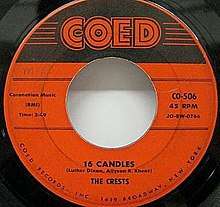16 Candles (song)
"16 Candles" is a 1958 song performed by The Crests and written by Luther Dixon and Allyson R. Khent.
| "16 Candles" | |
|---|---|
 | |
| Single by The Crests | |
| B-side | "Beside You" |
| Released | October 1958 (US) |
| Genre | Doo-wop |
| Label | Coed |
| Songwriter(s) | Luther Dixon and Allyson R. Khent |
Track listing
7" Vinyl
- "16 Candles"
- "Beside You"
Single originally released in 1958 on Coed Records # 506
Chart performance
- The song peaked at number two on the Billboard Hot 100 charts, while Stagger Lee by Lloyd Price was at number one.[1] "16 Candles" also went number four on the US R&B charts for 21 weeks in 1959.[2]
Covers
- Stray Cats recorded a cover of this song for the Sixteen Candles (1984) movie soundtrack.
- The soul group The Passions recorded a cover of this song in 1963 (Diamond Records # 146), and the Jackson 5 released the song on their 4th album.
- The song was used as a counter-melody to Jamie Horton's "They're Playing Our Song", which reached #115 in the US publication Music Vendor, November 1961.
- A cover by Jerry Lee Lewis peaked at number 61 on the Billboard Hot Country Singles chart in 1986.[3]
- The Jackson 5 covered the song on their album, Maybe Tomorrow.
In popular culture
- The song was used in the original 1972 release of John Waters' film Pink Flamingos, but was edited out of the 25th Anniversary Edition re-release in 1997 because the rights could not be obtained, and it was therefore also not included on the CD soundtrack which was issued at the same time.
- The original recording by The Crests features in the film American Graffiti (1973).
- The 1984 John Hughes teen movie, Sixteen Candles, took its title from this song. The cover by The Stray Cats appeared in the film.
- The sitcom Full House has an episode of season 3, entitled "13 Candles".
- The television series American Dad’s first episode of season 4, is named "1600 Candles".
- The popular rock band Fall Out Boy named a song on their album From Under the Cork Tree "A Little Less Sixteen Candles, a Little More 'Touch Me'", although the reference is more directly made to the 1984 film.
References
- "Top 100 Songs | Billboard Hot 100 Chart". Billboard.
- Whitburn, Joel (2004). Top R&B/Hip-Hop Singles: 1942-2004. Record Research. p. 138.
- Whitburn, Joel (2013). Hot Country Songs 1944–2012. Record Research, Inc. p. 194. ISBN 978-0-89820-203-8.
External links
This article is issued from Wikipedia. The text is licensed under Creative Commons - Attribution - Sharealike. Additional terms may apply for the media files.